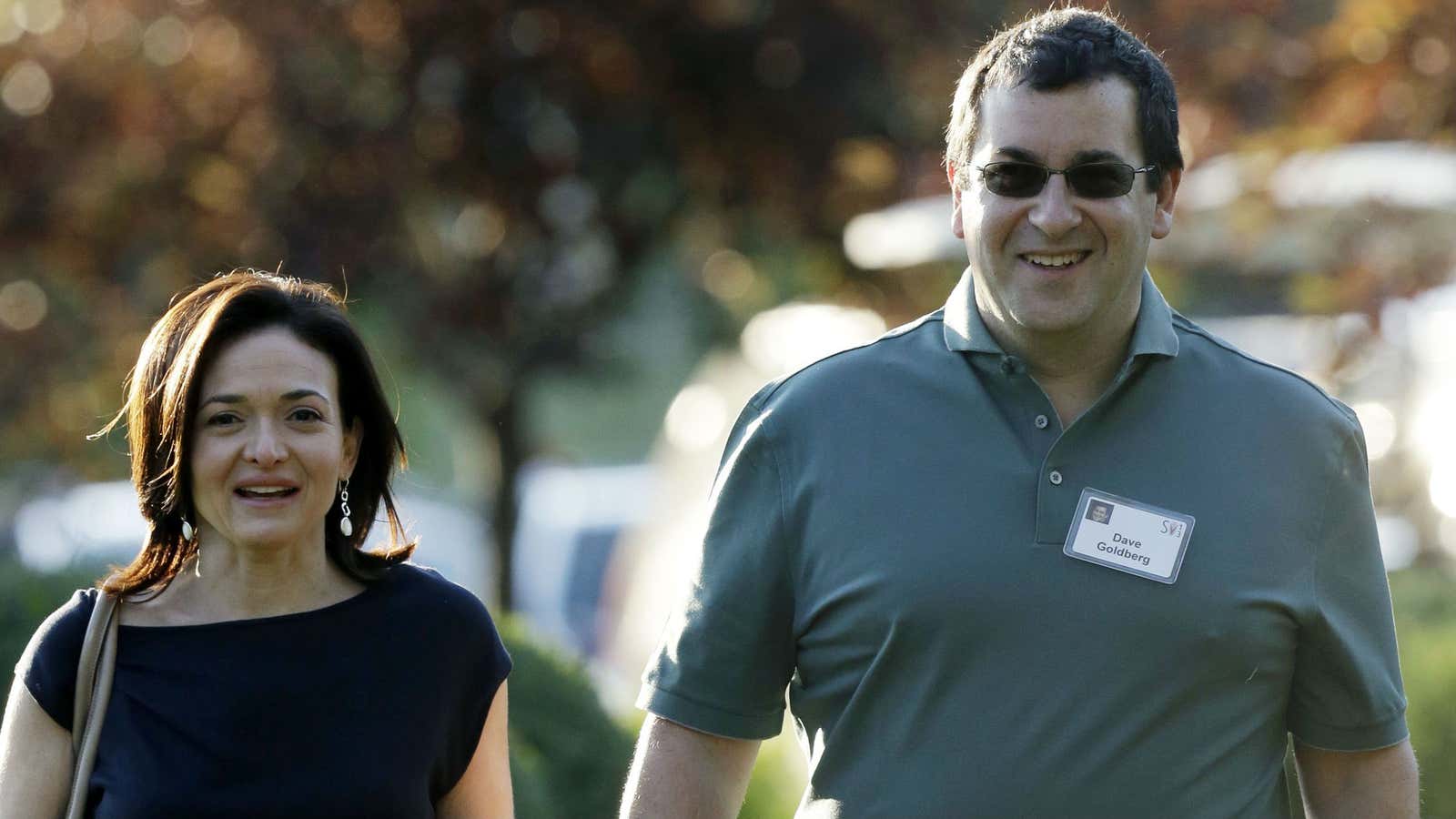When my father died in a car accident at 34, my mother was 38. She had two young daughters: I was eight at the time, my sister was five. In the face of a sorrow I can barely imagine, my mother had to keep going, somehow. After all, she had her job as a teacher to keep her busy, a family to provide for, responsibilities and commitments to take care of. Life does not come with a manual on how to survive the sudden death of your spouse. And yet she managed to be graceful, and loving, teaching us to marvel at life’s many wonders.
She is the strongest woman—the strongest person—that I know. Through her I came to understand the true power of life’s inextinguishable resilience.
I recognized that power today, in the words Sheryl Sandberg wrote marking the end of her husband’s sheloshim, a thirty-day period of mourning observed in the Jewish tradition. SurveyMonkey CEO Dave Goldberg, the love of her life and the father of her children, died suddenly while exercising in May. In her Facebook post, Sandberg writes:
A childhood friend of mine who is now a rabbi recently told me that the most powerful one-line prayer he has ever read is: “Let me not die while I am still alive.” I would have never understood that prayer before losing Dave. Now I do.
I think when tragedy occurs, it presents a choice. You can give in to the void, the emptiness that fills your heart, your lungs, constricts your ability to think or even breathe. Or you can try to find meaning. These past thirty days, I have spent many of my moments lost in that void. And I know that many future moments will be consumed by the vast emptiness as well.
But when I can, I want to choose life and meaning.
Of all her writings, this one has already been shared by more of the women I love and admire than anything else she’s ever published. I believe it’s her most important essay and, I hope, her most influential.
I have read Sandberg’s feminist manifesto, Lean In. I have watched her TED talks, and read her articles—often getting annoyed with advice that, I and many other women feel, is top-down, elitist, and infinitely removed from a daily life of the majority of women.
I read Lean In in an empty sublet room, on a borrowed inflatable mattress. I felt like I could not have been further removed from its author (although of course in fact I could have—Sandberg is not the only woman unable to perceive the depth of her own privilege). She wrote about salary negotiations at a time when I was working what felt like a million hours as a freelancer, accepting any job that would pay; she wrote about successful career choices at a time when I could not seem to land a single interview, forget a career; she acknowledged the importance of having a supportive partner at a time when I was single, with a long list of rejections behind me and no future prospects. Sure, her advice was sound for the winning types—but what about the rest of us? What about regular women who struggled to live even regular lives?
“Until now, I have been the older sister, the COO, the doer and the planner,” Sandberg wrote on Facebook, speaking of how this tragedy has changed her life. Indeed, Sandberg’s public persona has always been overachieving, in control, ready to work on herself—even when this meant going against her natural female instincts—in order to make it in a men’s world. This was perhaps the biggest critique I had of her: the way she conflated female characteristics with flaws. Self-criticism, a desire to be unimposing, emotionality: I wanted to look up to someone who embraced these qualities, not banished them. I strive for a world where I am free to be who I am—with my woman’s posture, tone of voice, and way of thinking—and still I am taken just as seriously as a man. I don’t see anything else as real progress, just temporary hacks.
I believe Sandberg today, a ”thirty years older, and wiser woman” after the past thirty days, can help us truly achieve that world. She is, today, the kind of woman I wish I’ll one day be: determined and emotional, successful and aware.
Of course, it goes without saying that no one would ever wish to trade family for this type of newfound understanding. It is clear from her writing that there is nothing she wouldn’t give for a few more days with her husband:
I was talking to one of these friends about a father-child activity that Dave is not here to do. We came up with a plan to fill in for Dave. I cried to him, “But I want Dave. I want option A.” He put his arm around me and said, “Option A is not available. So let’s just kick the shit out of option B.”
For her, and her children, option B at its best doesn’t hold a candle to option A at its worst. I have never believed the cliché that suffering makes us stronger. It does not. But it does show us how strong we have always been, revealing our most profound self in our darkest of days.
Sandberg’s poignant note shows what a truly impressive woman she is, a woman who dares to be vulnerable as well as open, a mother as well as a successful professional. In the midst of despair, Sandberg is perhaps the strongest she’s ever been, the powerful model I wished she could be. Despite this tragedy and also because of it, her influence will resound more profoundly than ever: proving to all who doubt ourselves just how much women are capable of.
